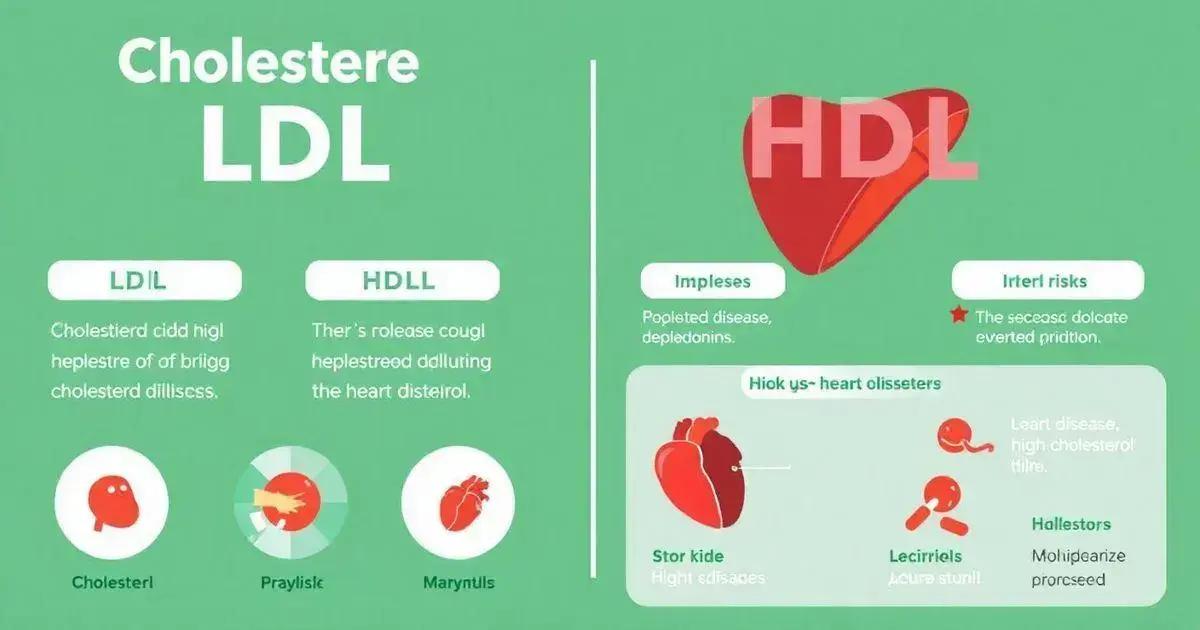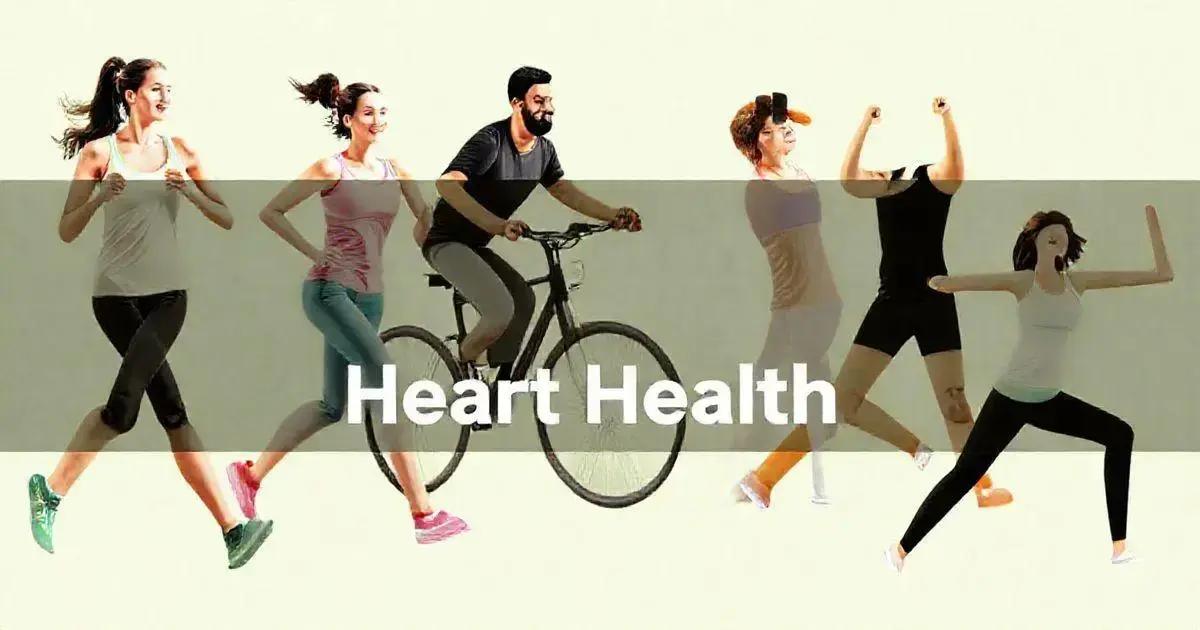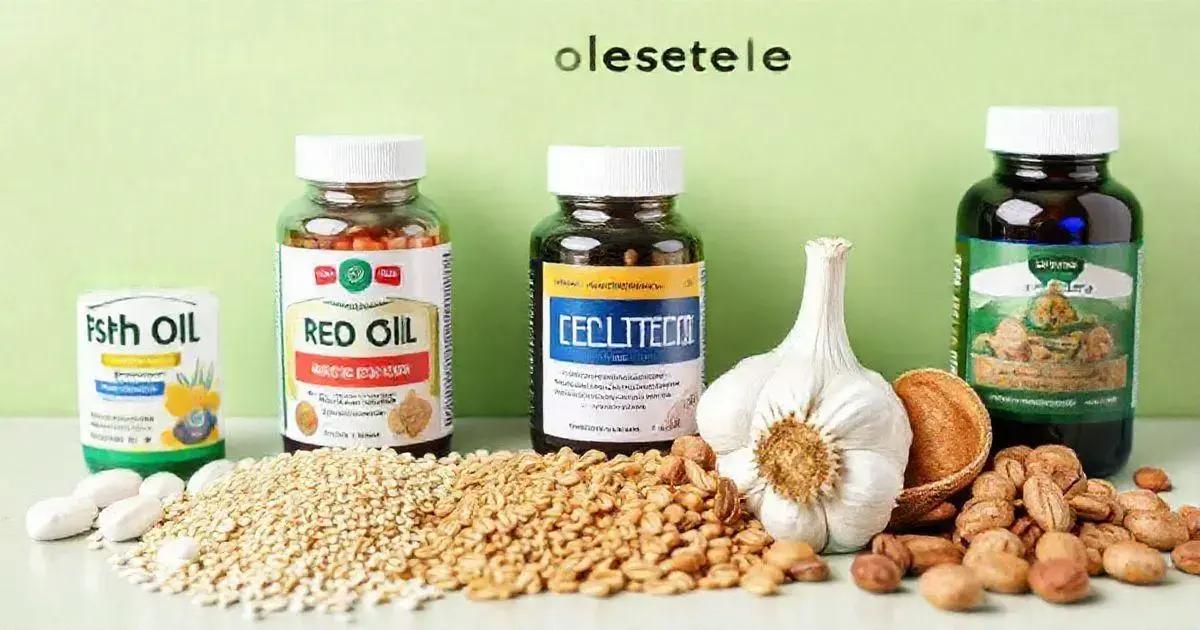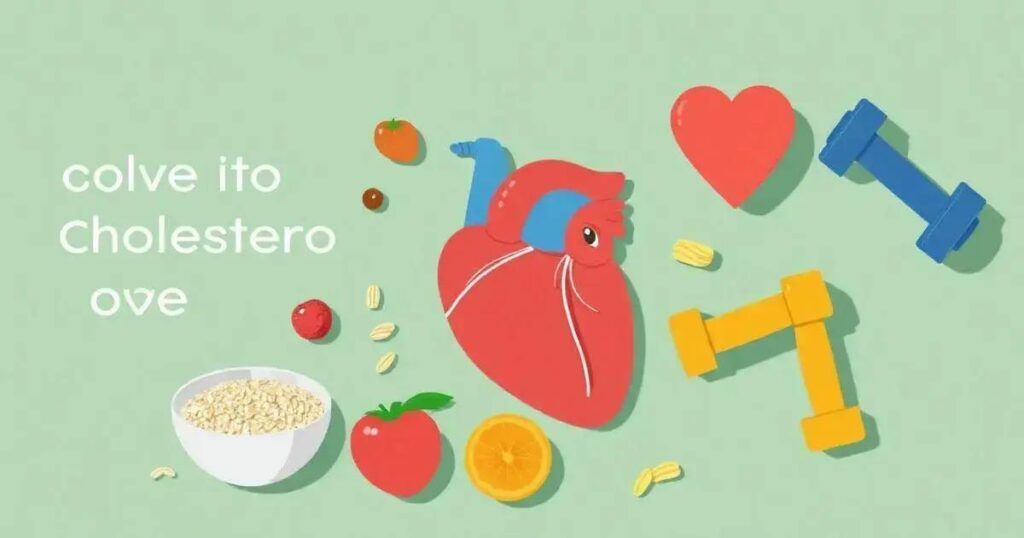To prevent high cholesterol without medication, focus on a heart-healthy diet rich in fiber, healthy fats, and natural supplements, alongside regular exercise to improve overall cholesterol levels and cardiovascular health.
High cholesterol is a silent danger, but you can combat it without medication. By making simple lifestyle changes, you can prevent high cholesterol and protect your heart. This article explores effective strategies, including dietary adjustments, exercise routines, and natural supplements that help lower cholesterol levels. Discover how to prioritize your health naturally with these actionable tips.
Understanding Cholesterol and Its Risks

Understanding Cholesterol: Cholesterol is a waxy substance found in your blood. Your body needs cholesterol to build healthy cells, but high levels can increase your risk of heart disease. Cholesterol comes from the foods you eat and is also produced by your liver.
There are two main types of cholesterol:
- Low-Density Lipoprotein (LDL): Often referred to as “bad” cholesterol, high levels of LDL can lead to the buildup of plaque in your arteries, which narrows them and restricts blood flow.
- High-Density Lipoprotein (HDL): Known as “good” cholesterol, HDL helps carry cholesterol away from the arteries and back to the liver, where it can be removed from the body.
Cholesterol Risks:
Having high cholesterol does not usually cause symptoms, so many people do not realize there is a problem. Over time, high cholesterol can lead to serious health issues, including:
- Heart Disease: Cholesterol can block arteries, leading to a heart attack.
- Stroke: Similar to a heart attack but affects the brain when blood flow is interrupted.
- Peripheral Artery Disease: Reduced blood flow to the limbs can cause pain and mobility issues.
Regular checks can help you monitor your cholesterol levels. Maintaining a healthy lifestyle is key to managing your cholesterol and reducing risks associated with it.
Dietary Changes to Lower Cholesterol

Dietary Changes to Lower Cholesterol: Making the right dietary choices can significantly impact your cholesterol levels. Here are several effective dietary changes you can implement:
1. Increase Fiber Intake:
Eating more soluble fiber can help reduce LDL cholesterol. Foods rich in soluble fiber include:
- Oats
- Beans and lentils
- Fruits like apples and pears
- Vegetables such as carrots and Brussels sprouts
2. Choose Healthy Fats:
Replace saturated fats found in red meat and full-fat dairy with healthier fats. Opt for:
- Monounsaturated fats: Olive oil, avocados, and nuts.
- Polyunsaturated fats: Fatty fish like salmon, walnuts, and flaxseeds.
3. Reduce Trans Fats:
Trans fats are harmful to heart health. They are often found in processed foods. Check labels and avoid:
- Partially hydrogenated oils
- Baked goods like cookies and cakes
- Snack foods like chips
4. Increase Omega-3 Fatty Acids:
Including omega-3 fatty acids in your diet can help improve heart health. Sources include:
- Fatty fish like mackerel and sardines
- Chia seeds and flaxseeds
- Walnuts
Making these changes in your diet can go a long way in lowering cholesterol levels effectively. Focus on whole, minimally processed foods for the best results.
Exercise: A Key to Heart Health

Exercise: A Key to Heart Health Regular physical activity plays a vital role in maintaining a healthy heart and managing cholesterol levels. Exercise not only helps lower LDL cholesterol but also boosts HDL cholesterol, enhancing overall cardiovascular health.
1. Benefits of Regular Exercise:
Engaging in physical activity offers numerous heart health benefits, including:
- Improving Blood Flow: Exercise helps strengthen the heart and improve circulation.
- Weight Management: Maintaining a healthy weight can help lower cholesterol levels.
- Reducing Blood Pressure: Regular activity can help regulate blood pressure, reducing strain on the heart.
- Lowering Stress: Exercise is a natural way to relieve stress and anxiety, both of which can impact heart health.
2. Types of Exercise:
Incorporating different types of exercise into your routine can keep it engaging. Here are some effective options:
- Aerobic Exercise: Activities like walking, jogging, cycling, and swimming are excellent for heart health.
- Strength Training: Lifting weights or using resistance bands can help build muscle and increase metabolism.
- Flexibility Exercises: Incorporate yoga or stretching exercises to improve muscle flexibility and reduce injury risk.
3. Recommendations:
The American Heart Association recommends at least:
- 150 minutes of moderate-intensity aerobic exercise each week
- 75 minutes of vigorous-intensity aerobic exercise
- Strength training on two or more days per week
Finding enjoyable activities can help you stick to an exercise routine. Joining a group, taking classes, or setting personal challenges can also boost motivation.
Natural Supplements for Cholesterol Control

Natural Supplements for Cholesterol Control can provide additional support in managing cholesterol levels effectively. Several natural options have been shown to have beneficial effects on cholesterol balance.
1. Omega-3 Fatty Acids:
Omega-3s, found in fish oil, can help lower triglycerides and boost HDL cholesterol. Good sources include:
- Salmon
- Mackerel
- Walnuts
- Flaxseeds
2. Plant Sterols and Stanols:
These substances, found in certain plants, help block cholesterol absorption in the intestines. They are often added to foods like:
- Margarine
- Fruit juices
- Yogurt
3. Soluble Fiber Supplements:
Taking soluble fiber supplements, such as psyllium husk, can help reduce LDL cholesterol. Dietary sources include:
- Oats
- Beans
- Barley
4. Red Yeast Rice:
Red yeast rice contains compounds that can lower cholesterol naturally. It works similarly to some cholesterol-lowering medications. Consult a healthcare provider before using it.
5. Garlic:
Garlic supplements may have a modest effect on lowering cholesterol levels and improving heart health. Adding fresh garlic to meals can also be beneficial.
Before starting any supplement, it’s important to consult with a healthcare professional to ensure it is safe and appropriate for your health needs. Combining these natural supplements with healthy lifestyle choices can enhance heart health.
Taking Control of Your Cholesterol
Preventing high cholesterol without medication is possible through a combination of healthy dietary choices, regular exercise, and the use of natural supplements. By understanding cholesterol and its risks, making informed changes to your diet, and embracing an active lifestyle, you can significantly improve your heart health.
Incorporating fiber-rich foods, healthy fats, and heart-healthy exercises can lead to better cholesterol levels and overall well-being. Additionally, natural supplements can offer valuable support. However, it is essential to consult with healthcare professionals before starting any new supplement regimen.
With consistency and commitment, you can effectively manage your cholesterol levels and enhance your heart health for a healthier future.
FAQ – Frequently Asked Questions about Preventing High Cholesterol Without Medication
What dietary changes can help lower cholesterol?
Incorporating more fiber, healthy fats, and reducing saturated and trans fats can significantly lower cholesterol levels.
How does exercise influence cholesterol levels?
Regular exercise helps improve HDL (good) cholesterol and lower LDL (bad) cholesterol, promoting overall heart health.
What are natural supplements I can take for cholesterol control?
Supplements like omega-3 fatty acids, plant sterols, and red yeast rice may assist in managing cholesterol levels.
How often should I get my cholesterol checked?
It is recommended to check cholesterol levels at least once every four to six years, but consult your doctor for personalized advice.
Can lifestyle changes really impact cholesterol levels?
Yes, adopting a healthy diet, exercising regularly, and incorporating natural supplements can effectively lower cholesterol without medications.
Should I consult with a healthcare professional before starting any supplements?
Absolutely, it’s important to discuss any new supplements with a healthcare provider to ensure they are safe and appropriate for your health.













